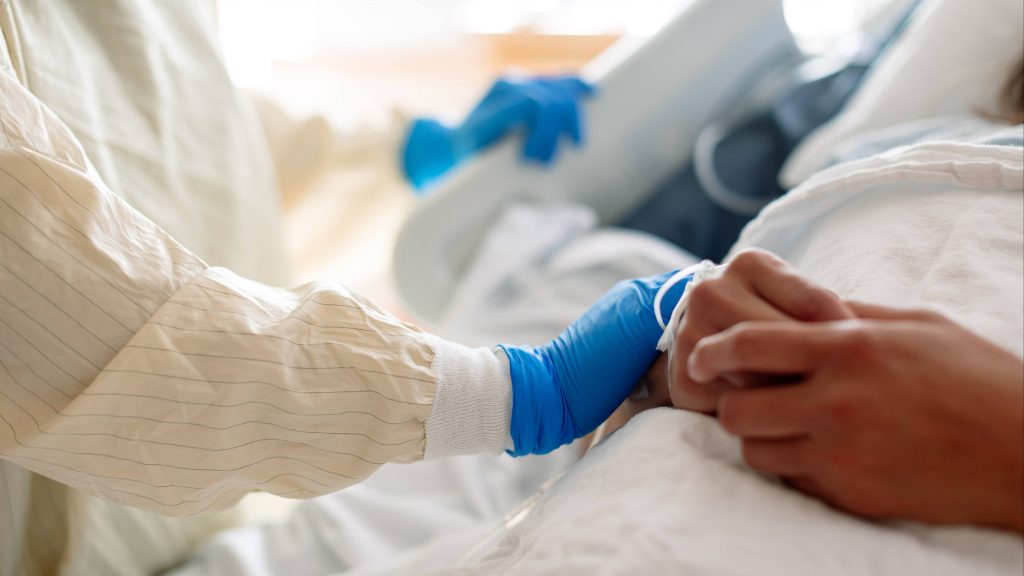-
Clinical Trials
How clinical trials work: COVID-19 and beyond

Clinical trials help researchers discover and apply critical advances in patient care. Clinical trials follow rigorous scientific processes that usually take many years to complete. However, during the COVID-19 pandemic, people have been able to see and experience clinical trials operating on fast-forward. And a lot of people are wondering, "How do clinical trials work?"
In this Q&A, the Mayo Clinic News Network Team sat down with Dr. Naveen Pereira, a Mayo Clinic cardiologist, and Dr. Andrew Badley, a Mayo Clinic infectious diseases specialist and chair of Mayo Clinic's COVID-19 Research Task Force, to get some answers and insights on some of the most common questions people have about clinical trials.
Watch: Dr. Naveen Pereira and Dr. Andrew Badley discuss how clinical trials work.
Journalists: Broadcast-qualtiy sound bites are in the downloads at the end of the post. Please courtesy: "Naveen Pereira, M.D./Cardiology/Mayo Clinic and Andrew Badley, M.D./Infectious Diseases, M.D./Mayo Clinic."
What are clinical trials, and what is their role in biomedical research?
Dr. Pereira: Every day when we see patients, we try to make a decision whether to give treatment A or treatment B. And the most rigorous scientific evidence of whether we should give treatment A or treatment B comes from what we call the gold standard of evidence when we compare two treatments in clinical trials.
Clinical trials form the backbone of the way we practice scientifically rigorous medicine. It’s the right thing to do for our patients. We learn what is the right drug, what is the right device, what is the right approach to adopt to make patients healthier and feel better ― and at the same time, very critically, make sure the intervention does not harm patients.
What are the stages of clinical trials?
Dr. Pereira: In general, clinical trials are divided into phases: phase one to phase four. The early phase clinical trials are typically small and determine whether an intervention is safe, whether it's feasible to deliver that intervention. Many times, we use healthy volunteers before we go on to sicker patients. So we gather all this rich information in early phase clinical trials and try to pinpoint and narrow down what we think is the most effective treatment. Then we can take that and implement large, later-phase clinical trials that involve thousands or hundreds of patients.
What happens in the lab before a drug, device or other intervention is tested in clinical trials?
Dr. Badley: To get a drug into a clinical trial is not a superficial thing to do. Often it involves years and years of work and thousands of potential drugs that enter the pipeline. Typically, what happens is a particular biomedical pathway that people think is important for causing infections or cancer, or heart attacks, is identified. And somebody says, "I want to make a drug to block this pathway."
It begins with understanding how those pathways work. And then you come up with a screening process to come up with chemicals or molecules to block that pathway. Next, there's a phase called medicinal chemistry, where chemists take the chemical or molecule they found through the screening process and make hundreds or thousands of variations to engineer the most desired properties, to have fewer side effects, or to be more effective.
Out of those thousands of compounds, it often comes down to one or two with the desired characteristics, and then toxicity tests are done to determine if they do anything unwanted. You do hundreds of experiments to prove it passes that level of scrutiny. Then you submit it to the FDA (Food and Drug Administration) for review and approval to move into clinical trials. And the FDA, through an abundance of caution, will most often come back and say, "Yeah, this looks good, but please do more experiments." So, the process to get to an FDA review is robust, and the process to get through an FDA review and approval is even more robust.
How does an intervention transition from clinical trials to patient care?
Dr. Badley: If you're lucky, about 1 in 10 or 1 in 15 of interventions that enter clinical trials actually make it through phase three trials and through FDA regulatory approval, which means that is now a drug you can prescribe. That's not where things stop.
There are phase four trials, post-marketing surveillance, which basically means after this drug is now in common use and people are prescribing it, is there anything that happens that is unexpected that causes negative consequences? Depending on the severity, that can either cause the drug to be withdrawn from the market, which is rare event because of all the previous safety studies or more often it can result in a warning being added to the drug, for example, do not use this drug in patients who are also receiving another drug. This post-marketing surveillance adds an additional level of scrutiny to the drug development process.
What is an example of a drug commonly used today that went through this process?
Dr. Pereira: Since I'm a cardiologist I'd love to talk about statins. Statins are a widely used drug to lower cholesterol. When we started off, we knew the basic science about statins. The drug inhibits a certain type of enzyme, and it, therefore, decreases cholesterol levels. Then we tested it in animal studies. And then we say, "Well it can lower cholesterol levels; it can perhaps decrease the blockages in the blood vessels of the heart." And then we say, "Well, maybe it can be helpful in human beings."
Then you take the statins and try implementing them in early phase clinical trials in human beings. And lo and behold, in humans the cholesterol level decreased. So that was great, but you can't stop there. Just because your cholesterol levels decreased doesn't mean that you're going to prevent a heart attack or stroke or death.
Then we move on to later phase clinical trials, and we now look for the hard end points using information we know from the early phase trials: the right dose to give that lowers cholesterol and doesn't produce a lot of side effects. We do what's called a double-blinded, placebo-controlled clinical trial. You have two groups: One group gets the statin medication; the other group gets a sugar pill called a placebo. No one knows what they're getting. And from that research, we now know that the statins clearly made a difference in cardiovascular disease.
Back in my early days of training, the Cardiac Intensive Care Unit was filled with patients who were having heart attacks. Now, fast-forward, we see more patients with severe heart failure than patients who have severe heart attacks because statins, thanks to clinical trials, have made a significant difference in slowing down the progression of coronary artery disease ― the blockages in the blood vessels of the heart ― and in preventing heart attacks.
What have physicians and scientists learned about clinical trials during the COVID-19 pandemic?
Dr. Badley: No. 1, that in times of crisis, we can accelerate the development and review process. Throughout the pandemic, many of these steps were accelerated. No steps were skipped in the development or approval process. It was just the amount of effort that went into the development and the review that was increased.
No. 2, when we come together as a society and as a biomedical community and perform these trials at multiple sites at the same time, we can execute clinical trials more rapidly. We did trials of some of these drugs in hundreds of sites at the same time, and that led to more rapid accrual of patients and therefore the ability to create conclusions about the efficacy in a more rapid way.
We also developed ways of making the trials easier to conduct. The trials were designed in such a way that most patients with the illness were capable of being enrolled in the trials. So basically, the trials became open to almost anyone, almost anywhere. And by not requiring testing only available at Mayo Clinic or other tertiary care centers, it made the results more interpretable toward the world.
Dr. Pereira: COVID showed the limitation that we have with traditional clinical trials. A lot of the traditional trials had to stop enrolling or had to restrict and modify patient visits, due to the need for social distancing and other problems, such as travel. The COVID-19 trials have taught us that you can use electronic means to communicate with the patient. We can guide the patient to a website, where they can look at a video about the clinical trial and then perhaps download the consent form, sign it electronically, and send it.
How will clinical trials change in the coming years?
Dr. Badley: The way we are conducting clinical trials today is shifting from how we did it even a year or two ago. What we're seeing now is that there are a large number of smartphone-enabled applications that allow you to measure those physiologic variables on your smartphone, which means when you're doing a clinical trial, you don't have to go back to the hospital or the clinic to get your EKG done or your pulmonary function test done, or the back of your eye looked at. Patients can do these (activities) at home. I believe the technologies that enable this are only going to grow, and I think that remote clinical trials will become the norm as opposed to the exception.
No question that the traditional model of clinical trials is selecting in favor of those people who have the time, the resources, the ability to travel to come to clinics to enroll in clinical trials ― and to show up for the follow-up. Having trials as a remote, digitally enabled process that can be done from your home or your workplace will enhance the acceptability of the trials to more people, and hopefully, we'll reach a broader representation of people across all characteristics: geographic, racial, socioeconomic, every variable you can think of.
Dr. Pereira: Underrepresented minorities — it's been an incredible problem trying to get them to be represented in clinical trials. People are different, and they can react differently to different interventions. It's going to be a very important battle that we need to undertake. We definitely need to represent minorities in clinical trials to reflect the true landscape of the United States and make sure that whatever treatments that we are assessing are applicable for all.
What are some important ways Mayo is innovating to enhance community engagement in clinical trials?
Dr. Badley: Many of our researchers are engaging with community leaders in the areas we serve. We have a large number of groups throughout Florida, Arizona and Minnesota who are working with community leaders to understand the health issues that are most of concern those communities. By engaging and addressing the individual community needs, we hope that Mayo can bring to those communities the trials they are most interested in so that we're responding to their health needs.
Dr. Pereira: We are also looking to partner with other institutions to enable more minority representation in clinical trials. We've formed a research center with a specific focus on engagement of people who are underrepresented minorities and are also trying to make cutting-edge research more accessible.
Learn more:
Learn more about clinical trials and their importance in medical research:
The Clinical Trial Journey
Read this explainer and watch the animated video, which is available in English and Spanish.
Clinical trials at Mayo Clinic
At any given time, Mayo Clinic has more than 3,000 clinical trials underway to solve the world's most challenging medical problems.
____________________________________________
Information in this post was accurate at the time of its posting. Due to the fluid nature of the COVID-19 pandemic, scientific understanding, along with guidelines and recommendations, may have changed since the original publication date.
Related Articles








